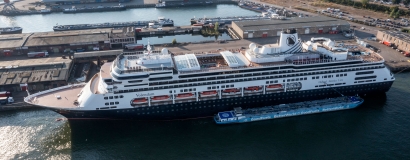
During the first five days of the test, the vessel used a mix of 30% sustainable biofuel and 70% marine gas oil (MGO) in one of its main auxiliary engines. For the second part of the test, the ship used 100% (sustainable) biofuel. During the final 15 days of the trial, the companies reported a minimum of 78% decrease in lifecycle CO2 emissions compared to ‘traditional’ marine gas oil emissions. The trial and accompanying assessments were completed on Sept. 7.
“We were excited to have this opportunity to test a next-generation fuel resource on a Holland America Line ship, and we are very encouraged by the results,” said Gus Antorcha, president of Holland America Line.
“As part of our commitment to sustainability, we have always looked for cutting-edge solutions to environmental challenges that will help us meet Carnival Corporation’s sustainability goals over the coming decades.”
Holland America Line had selected the Dutch-flagged Volendam for the test as it was located at the Port of Rotterdam, one of the global ports where GoodFuels operate the infrastructure necessary to provide biofuel waterside fueling services. There is no significant difference for the ship’s team members in handling regular fuel oil versus biofuel.
The use of “drop-in” biofuels such as the one tested on the Volendam does not require any modifications to the engine components or fuel infrastructure and enables instant decarbonization impact.
The sustainable marine biofuel (SMF) or ‘advanced biofuel’ that GoodFuels supplied for this trial is derived from feedstocks that are certified as 100% waste or residue, with no land-use issues and no competition with food production or deforestation.
“Marine biofuel is already the biggest low carbon marine fuel in the world and we expect usage to rise sharply to 10% of total volume by 2030,” said Dirk Kronemeijer, CEO and founder of GoodFuels
“Our extensive work in testing alternative marine fuels is a central part of our efforts to shape viable decarbonisation options for our customers,” said Ricardo Opperman, managing director of Wärtsilä North America Inc.
“We are continuously developing our engine technology to accept and retain operational and environmental efficiency levels with various future fuels, including biofuels. These sea trials with 100% biofuel will be especially important — for Carnival Corporation, for Goodfuels, for Wärtsilä, and for the industry as a whole.”

